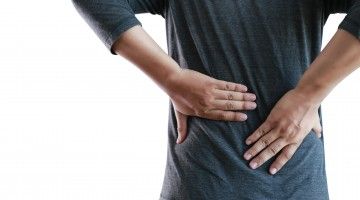Pain and work
Pain, including neck pain and low-back pain, is a leading cause of work absenteeism in Canada and other industrialized countries. Among injured workers, pain can interact with other factors to prolong time off work. IWH research on this topic ranges from early studies on the treatment of pain and prognostic factors for recovery, to more recent interest in pain as a factor in the return-to-work outcomes and other post-injury experiences of injured workers.
Featured

IWH Speaker Series
Persistent pain: its role in work absence, health, and employment after a disabling work-related injury
Published: November 15, 2022
Journal article
Journal article
Opioid use among injured workers: pain and the return-to-work experience
Published: Occupational and Environmental Medicine, February 2025
Journal article
Journal article
An observational study of pain severity, cannabis use, and benefit expenditures in work disability
Published: Canadian Journal of Public Health, January 2024

IWH in the media
Mental health comorbidities affect workers' recovery from back pain: report
In an article about a report on comorbidities and low back pain from the Workers Compensation Research Institute, reporter Jim Wilson cites IWH research about persistent pain among injured workers in Ontario.
Published: Human Resources Director Canada, December 2023
Journal article
Journal article
Association of persistent pain with the incidence of chronic conditions following a disabling work-related injury
Published: Scandinavian Journal of Work, Environment & Health, April 2023
IWH Speaker Series
IWH Speaker Series
Persistent pain: its role in work absence, health, and employment after a disabling work-related injury
Among working-aged adults, one of every six injuries that need medical attention are caused by work exposures, with over a third of these injuries leading to periods of work absence or disability. Chronic or persistent pain may occur after an injury. It is currently unclear how many workers experience persistent pain and how it impacts worker health and function, return to work and disability benefit expenditures. In this presentation, Dr. Kathleen Dobson shares findings from a study of Ontario workers experiencing a work-related injury or illness focusing on the prevalence of persistent pain, and its association with return-to-work outcomes.
Published: November 2022

At Work article
Cochrane back group earns high praise for its rigorous systematic reviews
Recent assessments of low-back pain research have give high marks to Cochrane Back and Neck systematic reviews, citing rigorous methods.
Published: November 2020

Sharing Best Evidence
What workplace interventions help workers with MSDs, pain and mental health conditions return to work?
This update of a previous systematic review sets out to find workplace-based interventions that are effective in helping workers with musculoskeletal, pain-related and/or mental health conditions return to work.
Published: December 2019
Journal article
Journal article
Prescription dispensing patterns before and after a workers' compensation claim: an historical cohort study of workers with low back pain injuries in British Columbia
Published: Journal of Occupational and Environmental Medicine, July 2018

IWH in the media
Opioids linked to longer disability leaves
A Canadian review of five studies have found a link between opioid prescriptions and longer duration of time on disability, writes Sarah Dobson, who interviews Dr. Nancy Carnide and Dr. Andrea Furlan, among others, about implications of this IWH study.
Published: Canadian HR Reporter, June 2018

At Work article
Studies consistent in finding a link between opioids for MSDs and longer work disability
A systematic review on early opioid prescription for MSDs and work disability finds a consistent link with longer work disability. However, review authors urge caution in drawing a conclusion about cause and effect.
Published: February 2018